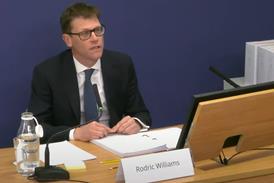The Solicitors Regulation Authority and National Crime Agency have joined forces with the home secretary and chancellor of the exchequer in what is billed as an assault on economic crime including fraud, bribery and money laundering.
A new taskforce, to be known as the Economic Crime Strategic Board (ECSB), will set priorities, direct resources and scrutinise performance in dealing with economic crime.
SRA chief executive Paul Philip is a member of the taskforce’s strategy board. As well as the SRA and NCA, members also include representatives from the finance industry, government ministers and law enforcement figures. Paul Tennant, the Law Society's chief executive, also attended the meeting.
Home secretary Sajid Javid and chancellor Philip Hammond will chair the taskforce. At the board’s first meeting, the home secretary said the department will commit £3.5m in 2019/20 to support work to reform the suspicious activity reports (SARs) regime - which flag up potential money laundering and suspicious activity to the NCA.
Hammond said: ‘The UK is leading the world in the fight against illicit finance, preventing fraudsters from stealing billions from the public each year. By bringing together specialists across the public and private sector, we can use the best of our expertise to maintain our status as a global financial centre.’
However specialist lawyers told the Gazette that the government should ensure enforcement bodies, including the NCA and Serious Fraud Office, continue to have adequate resources.
Alison Geary, counsel in the UK white collar defence and investigations practice at international firm WilmerHale, said although the decision to engage senior figures is to be welcomed, it is not simply an issue of ensuring resources are properly directed but also of making sure that government agencies tackling economic crime have sufficient resources, including the right legislative tools, international agreements and funding.
Barry Vitou, shareholder at international firm Greenberg Traurig’s London office, said that in the midst of Brexit the announcement of the ECSB ’underscores the importance placed on combating economic crime’. However, he added that although the government has ’shaken up laws’ to combat economic crime and created the National Economic Crime Centre there has only been limited additional funding. ‘It remains to be seen whether these new laws and bodies translate into more enforcement or are simply symbolic,’ he said.

















![David Lester (senior partner at Blythe Liggins), Darryl Barnes, Jagdeep Sandher (head of dispute resolution at Blythe Liggins)[4]](https://d1d8vslyhr7rdg.cloudfront.net/Pictures/274x183/4/2/8/116428_davidlesterseniorpartneratblytheligginsdarrylbarnesjagdeepsandherheadofdisputeresolutionatblytheliggins4_981603_crop.jpg)






5 Readers' comments